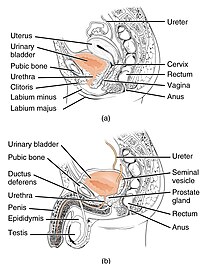
Photo from wikipedia
Abstract Background: Urinary incontinence (UI), affects women more frequently than men, with a prevalence to 30–40% of perimenopausal women and almost 50% among women aged over 70 years. caused severe… Click to show full abstract
Abstract Background: Urinary incontinence (UI), affects women more frequently than men, with a prevalence to 30–40% of perimenopausal women and almost 50% among women aged over 70 years. caused severe psychological burden and bringing negatively impact to the quality of life, increased caregiver burden and economic cost. Acupuncture is often used to treat them. We aim to conduct a systematic review to evaluate the efficacy of acupuncture for women experiencing UI. Methods: The following electronic databases will be searched from inception to Jan. 2020: Cochrane Central Register of Controlled Trials (CENTRAL), PubMed, Web of Science, EMBASE, China National Knowledge Infrastructure (CNKI), Traditional Chinese Medicine, Chinese Biomedical Literature Database (CBM), Wan-Fang Database and Chinese Scientific Journal Database (VIP database).All published randomized controlled trials in English or Chinese related to acupuncture for urinary incontinence in women will be included. The primary outcome will be the change from baseline in the amount of urine leakage measured by the 1-hour pad test. Adverse events will be the secondary outcome. Study selection, data extraction, and assessment of study quality will be performed independently by two reviewers. RevMan V.5.3.5 software will be used for the assessment of risk of bias and data synthesis. Results: This study will provide a high-quality synthesis of current evidence of acupuncture for UI from the 1-hour pad test. Conclusion: The conclusion of our study will provide an evidence to judge whether acupuncture is an effective intervention for patients suffered from UI. PROSPERO registration number: CRD42019133195
Journal Title: Medicine
Year Published: 2019
Link to full text (if available)
Share on Social Media: Sign Up to like & get
recommendations!